New Shafston Great House | Part 3

George Pinnock Memoir
My sister Mrs. Grace March a short time before her death wrote a memoir of her early childhood and as I am now an old man and have in all probability very short time to live I wish to put on record a few words on the theme of my own childhood and early youth and at the same time to correct what I think are one or two errors unto which my sister has fallen.
I was born, according to my father’s record in an old family Bible, on the 13th March 1824 at New Shafston in the Island of Jamaica. New Shafston was an estate which contained according to survey an area of 2147 acres and two roads and was part of a larger estate called Shafston which formerly belonged to a Mr. Allwood, the father of the Reverend Robert Allwood at one time incumbent of St James Church in Sydney, New South Wales.
New Shafston was bought by my Great uncle Philip and was by him devised to my Grandfather George who allowed my father Philip to reside upon it and from the profits thereof to support himself and his family on payment of a yearly sum.
My mother was the youngest daughter of Dr David Grant, who at one time lived at Kingston in Jamaica and afterwards went to practice at Bath in England where my Mother was born. After the death of my Grandfather Grant his widow returned to Jamaica for a few years to look after some estates which her husband had possessed in Jamaica, and took my Mother with her.2
Before she went to Jamaica my Mother had been to a school in Bath and afterwards to one at Clifton kept by Miss Garret. My father had been educated at Westminster and during the holidays resided with his Aunt Mrs. Gwynne.
New Shafston is most beautifully situated on the south west coast of the Island of looking over a bay called Bluefields. To the east are wild headlands called Black River Heads and to the west is the most western point of the Island known as Negril Point about midway towards which from New Shafston is the town and port of Savanna-la-Mar. The shore of the bay a beautiful sandy beach abounding with shells is hidden from the view by a few low hills on which the original Shafston House is built; but as our house was on a rising ground above a rich grassy valley we had a very extensive view of the sea beyond, and above the house the ground rose into the mountains which were clothed with great varieties of timber trees. An old friend, a Mr. Senior, was the owner of Old Shafston as also of all adjoining property called Belmont where he lived.
My sister in her memoir says that our family is of Norman descent from whom she got that information I know not; but I am inclined to doubt its correctness. There is no doubt it came originally from France, but I am inclined to the opinion that it was of British not Norman origin. I base my opinion on two reasons. One is that the name formerly spelt Pynnoke has more of a British than a Norman sound, and the other is that in the county of Cornwall, where the inhabitants are chiefly of British origin3 there is a large village or market town not far from Liskeard called St Pinnock. But it is a matter upon which I do not pretend to give any certain opinion.
The earliest event which I can remember occurred when I was about two years old. I had been taken by my father and mother to my Grandfather’s place near Kingston to be christened. I remember being a long way from home, and that I was being borne in my nurses arms when we came close to a windmill. We came very close to it, and when I saw the enormous sails which appeared to be coming over my head to crush me I screamed most lustily. I mentioned the circumstances some years afterwards to my mother and she said that it occurred near Montego Bay on the northwest coast of the island on our return to New Shafston after a very fatiguing journey over the mountains.
From this time my memory is a blank until I was about 4 years old when I had my brother Philip as my companion and playmate, and about which time he was christened, he was a daring precocious child, and soon began to talk very boldly. I remember my father saying to him “The clergyman is coming to christen you tomorrow and I hope you will behave quietly” to which my brother putting up his little fist replied “I will say you Sir knock him down.” However when the time came for the performance of the rite he behaved with becoming propriety. Another amusing incident was when a woman peddler came to the house with a basket full of wares of different kinds amongst which were a number of small shoes for children. One of the pairs was of red morocco which seized my brother’s fancy but they were alas, too small for him; but he would not be satisfied until he had them, and a slit was made in the insteps of each shoe, so as to enable him to put them on his feet.
Shortly after this my brother was seized with a severe illness, and for a day or two his life was despaired of. At great expense the service of two doctors was obtained and at last a dose of some very powerful medicine was given. Soon after the administration of which he recovered.
Not many months after the occurrence I have above narrated took place, I met with a serious accident. My brother and I got hold of a steel stiletto out of my mothers work basket with which we began to dig at a knot in the dining room floor. My brother was digging and I was looking intently over him watching his operations when unfortunately the instrument slipped up suddenly and the point entered my left eye. I was for several weeks confined in a dark room, with my eyes were tightly bandaged, and I was fed nothing but milk. This was a weary time indeed; but at length the trial came to an end and the bandage was taken off my eyes, and I was allowed to have my liberty once more.
Our life was on the whole a very monotonous one. During the heat of the day we were not allowed to go out of the house; but in the early morning, before sunrise we were dressed and taken on a ride on mule back to the seashore to play on the sand and gather shells. On our way we passed along a wall enclosing Old Shafston where there were peacocks and peahens and we sometimes added to our own spoils by telling the Mulatto lad who accompanied us to clamber over the wall to pluck a few feathers from the tails of the peacocks. Sometimes we brought home fruit, such as oranges, sweetsops, soursops and mangoes which grew luxuriously in the open ground. For the mangoes the boy Jack had to climb a large tree which grew near the house. We also went occasionally to the cattle yards where the cows were being milked and had a glass of fresh warm milk. At 8 o’clock, after we had returned home we had breakfast and then went hard to work at our lessons. My mother was the teacher and she was most assiduous in her labours. What hard work it was for me to learn the multiplications table! I found it terribly hard and I often thought my dear mother very cruel to put me to such mental torture. However I got over it at last and before I was six years old had learned the four first rules of arithmetic and could also do exercises in long division and the rule of three, and could also read tolerably well.
There was a book called English Stories- Traditions from English History; such as the story of Fair Rosamund Hubert and Bruce Arthur. The murder of Edward the 5th and his brother in the Tower and several other tales in all of which perhaps, there was as much fiction as fact, but they were very platonically told and I shed many a tear over them. I was also much interested in a book called Northern Regions – a narrative of the voyage of Captain Parry to the North Pole. I also used to read to my mother Goldsmith’s History of England and his History of Rome; and my father who had a good voice taught me a song of the Kings of England beginning
“The Romans in England they once did away
“The la-ors they after them led the way
“They tugged with the Danes till an overthrow
“They both of them got by the Norman bow.”
It then went on through the whole list of English Kings from the time of William the Conqueror to the time of George the third.
It cannot be wondered at therefore that, for my years, I had a fair knowledge of English History. I remember going one day with my father and mother to an estate near our own called Mount Edgecumbe. The dwelling house was a very large one standing on a headland over the bay, and derived its name on account of its situation everything that of Mount Edgecumbe in England.4 The owner at Wedderbern resided in England and the estate was managed by a burly Scotsman named Cameron who showed us over the house in which was a room hung with numerous oil paintings. At one end was a picture which attracted my attention. It represented two boys in bed and asleep and a ruffianly looking man bending over them. I drew my mother’s attention to it and said ‘Oh Mamma! That is a picture of Edward the 5th and his brother the Duke of York who are to be murdered.” Cameron who was standing by quietly said, “The eluel has a laughead”. The other books my mother used to make me read to her were Miss Edgeworths’ Harry and Lucy, and Rosamund and the book called Landford and Mertor; but I took no interest in them and reading them was somewhat of an infliction to me.
Such was our home life varied occasionally by the arrival of travellers when the services of our mulatto servant who was an excellent cook and had the facility of making a great deal out of a very little at the shortest notice were called into requisition. We sometimes also visited our neighbours the Lewis‘s and also the Scotts who lived at a place called Hopeton about 7 miles inland from Shafston and it was a great pleasure to me to go to the latter place; they were very kind people, added to which Mrs. Scott was a very pretty woman and beauty was ever a great attraction to me. Another episode in our home life was the annual visit of my father to his father who lived at a place called Clifton at the other end of the Island near Kingston. He was generally gone for about a fortnight and how we counted the days when he would return! Of course he brought us all presents; but I can honestly say it was not chiefly for that we longed for his return, but because he was so good and kind to us. How soon, alas was this time of happiness to end!
But the evil day was not to come until an event had happened which added to our happiness. On the 27th April 1829 my youngest sister Charlotte was born. My elder sister my brother and myself were sent a day or two before the event occurred to the overseers house on the plea that my mother was ill and wanted the house to be kept very quiet and Ann Prendergast was to take care of us and see that all our wants were supplied. We of course, had great difficulty in spending our time to our satisfaction and the best thing I could find in the way of amusement was in reading a book I got from the Overseers shelf. A book of horrors with numerous illustrations adding much to the horror of the book. Among other stories was one of a living skeleton. It was a particularly dreadful story and the only one in the book of which I have any recollection. But we were not to remain very long in our place of exile. In a day or two we were told we could return to the house if we were very quiet. When we entered we were shown into the room where my mother was lying and were told to go round to the side of the bed furtherest from the door and then to our surprise the sheet was raised and we beheld our newborn sister.
When my mother recovered, things took their ordinary course except that for the first two or three weeks our lessons were not attended to as usual. Our little sister grew apace. She had a beautifully fair complexion with golden hair and features very much like those of my father, and when the sad occurrence which I am about to relate took place, was the pride of our house.
But now the time of happiness was drawing to a close. Towards the end of the year 1830 my father died at the age of 45 as my sister Grace has described, and bitter was the grief of my mother and the whole household. It was the first time I had been brought face to face with death; and that I should never again see him whom I so dearly loved was a grief which it was hard to bear. Well do I remember viewing from an upper window with my brother and sisters the procession which bore him to the grave. We all of us wept and sobbed aloud and often did we go to the place where he was laid- under the shade of a large Shaddock tree in the garden behind the overseers house, close beside his uncle Philip and his wife. All consecrated ground to all but ourselves.
At Christmas time in the following year the Negro insurrection took place which has been described by my sister. I remember the warning sent us by our kind friend Mrs. Senior, and as for the reasons stated by my sister all of us could not go that evening, and my life, as heir to the property, was decided to be most in danger, advantage was taken of the gig which was sent by Mrs. Senior to take me to Savannah-la-Mar the nearest port to Shafston. I was packed in the early morning between Miss Senior and the lad who drove us, and after a sad leave taking, the necessity in which I hardly realized, we went our way. After a journey of between two and three hours we arrived at Savannah la Mar the first town I remember to have been. I remember that the church and the displays in the shop windows although the town was a small one filled one with surprise and I fear, drove away much of the sorrow I had left in leaving my home and the dear ones there. We drove to the residence of Mr. Thomas Hill, a retired naval officer, situated on flat ground near the sea a little to the eastward of the town, and entered a room where I was introduced to a beautiful lady [Mrs. Hill] and several naval and military officers, among them Captain Owen Commander of the war sloop Blossom which was then in the harbour. The Governor of the Island was not there, as my sister Grace alleges in her memoir. Indeed, at such a time it would have been most improper. The rebellion was wide spread over the whole island and to have left Spanish Town the headquarters of the Government would have been a gross violation of duty and would have been putting his own life in peril.
There was a great disparity that night at Mr. Hills’ at which of course, I was too young to be a guest and I was sent early to bed in a room which Mrs. Hill kindly afforded me. In the morning I became acquainted with my first friend Tommy Hill bigger than myself and rather wild and uncared for, whose acquaintance with me my mother did not encourage.
In the evening of this day, when it was getting dark, my mother and the rest of the family arrived and Mrs. Hill intended to them the occupation of the room in which I had slept the night before, until lodgings could be obtained for us in the town. These were fortunate enough to obtain during the following day in the house of a Mr. and Mrs. Malartre in the principal street and not far from the water. Mr. Malatre was a little man and belonged to the militia, and I remember his coming home one night after having had a narrow escape. For the next morning exhibited his military hat the colour of which had almost been torn off by a bullet. The town was under martial law. At the top of the principal street where two roads met, one from the east and the other from the west, two cannons were placed, one pointing down the eastern road and the other pointing down the western road, and all day and night they were in the care of artillerymen; and no one was allowed to go out after nightfall without giving the password. This used to be given to us by the hands of a young midshipman called Hawkey. My mother and I looked upon him as heroes and envied him the small sword which he wore at his side, and which we often got him to put upon us; but as he was a much bigger boy than either of us and the waist straps was too loose for our small bodies he would place it over one shoulder so that it could hang there from and pass over to the opposite side. This arrangement though not comfortable was quite to our satisfaction. The day however Hawkey did not arrive; the reason for which we were told was, that he had been making too free with his weapon, and had been placed under arrest.
We had one night a great alarm. Crowds of people entered the town crying that the rebels were upon us. There was great crying and lamentations and Mr. Malartre’s house was taken possession of by a mob. Many desired to be taken to the war ships and were very up gregarious because their desire was not complied with. The terrible night however passed away without the anticipated catastrophe; and when the morning came the alarm was found to have been a pointless one.
While at Savannah-la-Mar we often heard of the dreadful deeds of bloodshed and murder; but the only case I can remember was one of which a Mr. Holmes was a victim. He was nailed to a cross and shot at till he was dead and his unfortunate wife was made to look on at the terrible spectacle and was afterwards, a prisoner, made to work for her husband’s murderers; but after a week or two she was rescued.
I remember the death at Savannah-la-Mar of my Uncle Sam’s widow narrated by my sister – Aunt Louise as we used to call her. There was a large procession to the Church and my brother and I were taken to the funeral in a basket carriage. This was the second time on which I had been brought face to face with death.
While at Savannah-la-Mar my mother received a letter from my Aunt Mary Ann informing her of the riots at Bristol and the ravages of Asiatic cholera at Gloucester where my Aunt was then residing with my Grandmother Grant.
About the beginning of February the rebellion was well nigh quelled and it was then for the first and only time I saw Sir Willoughby Cotton, the Commander of the Island Forces. As all was then deemed quiet he was taking his ease at Mr. Hill’s. He was a stout fat man and lay during the hotter part of the day in a hammock in the verandah twisting a corkscrew. I have not spoken much of Mr. Hill. He was a tall broad shouldered man and looked more like a guardsman than a sailor. He was very amusing in his conversation but invective. He tyrannized over his beautiful wife of whom, after exhausting his body by uproarious mirth he would sit and ruminate till he had regained his composure.
In the month of February of 1832 the rebellion was smothered, and it was thought we could return again to our home. About half a dozen of our Negroes came and volunteered to row us in an open boat to our place. My mother not wishing to show any fear consented to accept the offer and she, Grace, little Charlotte and myself accordingly went with them and were soon wafted to the beach near Shafston. My brother Philip who was afraid of the water but had a passion for horseback went on his pony under the escort of the mulatto boy Jack, and arrived at the house soon after we did.
My mother was contemplating a return to England where she would join her mother and sister and have our education attended to. The means of course had to be obtained and at length, after reposition with my Grandfather George it was agreed that the necessary funds should be allowed us for the voyage and £200 for our support out of the income of the estate. So all being ready on the 2nd June 1833 we went on board the ship ‘Caroline” lying at anchor in Bluefields Bay.
A ship of 700 tons burden bound for Bristol. There were no ocean steamers in these days. The Captain was a Mr. Smith a tall quiet well behaved man. His chief Officer a Mr. Barker was a little forward man with large black whiskers. The passengers besides ourselves and our old Negro servant Susan Scott were an old lady and a Mrs. Daley who was a cripple, and her niece Miss McAdam and a young man of the name of Suttor. During the whole of the 2nd of June and the greater part of the 3rd we were kept lying at anchor in the bay waiting for the Captain who had gone to Savannah-la-Mar on some necessary business connected with the ship. Whilst he was away I observed an optical puzzle which much surprised me. The ship scourging on its anchor appeared to me motionless, but the land appeared to me to be continually shifting its place. At one time it was seen on the starboard side, at another on the port side, sometimes at the stern and at other times at the prow; but before proceeding with the narrative I wish to back a little to mention that all the Negroes on the estate accompanied us to the shore to bid us farewell. Many of them shedding floods of tears. Poor Souls! I fear their lot was not as comfortable with the Agent and Overseer as it had been with us and my good tender-hearted father when he was alive, and I have no doubt their hearts were full of anxious foreboding as to the change which was about to take place.
On the 3rd of June, my brother’s birthday he was then just 7 years old. The Captain arrived late in the afternoon and the order was given to weigh anchor. This was a novel sight for us little ones and we stood watching the sailors at work at the capstan with the greatest of interest. Then the sails were set and we began to move. The darkness was now coming on apace. There is very little twilight in those regions and we soon had to retire below. My mother and two sisters occupied one of the after cabins, Mrs. Daley and her niece the other cabin, and my brother and myself occupied a cabin between us, next to our mothers on the port side of the ship, and on the starboard side opposite to us was Mr. Suttor’s cabin.
Had we not been children to when all things we saw were new we should doubtless have found the six weeks tossing and tacking about in the Atlantic dreary enough. The [ ] and often seabirds were a great source of interest to us, and we also caught two or three sharks which the sailors dispatched with great cruelty when they were dragged to the deck. The sailors beat the animals with lagging rods until, added to the want of their natural elements they were quite exhausted and one of the sailors went behind the animal and cut off its tail with a large knife when is soon died from loss of blood. I felt very much for the shark; not so the sailors for they regarded the brute as their natural enemy and had no sympathy with them.
Our little sister Charlotte was a great nuisance and once she amused all who saw her by strutting up the deck as she had seen the Captain do and addressing the quartermaster said “How’s her head”?
I must now describe our fellow passengers; Mrs. Daley was an old lady and as I have before said was a cripple and she remained all day in her easy chair in her cabin. Her niece Miss McAdam was a girl of about 16 or 17 years of age and on account of her Aunts’ infirmity had very much her own way and used to make love to the Chief Officer. One day when they were engaged in a flirtation on the deck my brother crept behind the young lady and pinned up her petticoat and as she was leaving the deck after the flirtation was over. The cabin boy who was a bit of a wag went up to see and said “If you please Miss there is a reef in your topsail”. My brother and I were very mischievous and on one occasion we managed to get hold of some dress clothes which Mr. Suttor had left out to air and stuffed them with straw which the cabin boy procured for us so as present the figure of a man, and put upon it a hideous device like a human face and then eased it up at the end of Mr. Suttor’s berth. When we retired as it was supposed to bed, we waited patiently with our cabin door half open to see the result. At length Mr. Suttor entered his cabin and immediately we were petrified by hearing a shout of horror. Mr. Suttor however was a good natured man and soon forgave us when he heard who were the culprits.
On another occasion when Mr. Suttor was sleeping on the quarterdeck my brother espied a tarpot and brush close by: he could not resist the temptation and immediately began to give Mr. Suttor whiskers and moustache. Before the operation was performed however Mr. Suttor awoke and catching hold of my brother a tragedy might have been averted had not two or three sailors who happened fortunately to be close by promptly came to the rescue.
Mr. Suttor was very fond of eggs and generally had one or two for breakfast; but alas the eggs were not always fresh as they should have been. One morning he broke two or three one after the other only to find them stale and unpalatable. At last he broke another only to find the commencement of animal life. That was too much for him and he sorrowfully declared he had had enough.
When six weeks had just passed we came near to the English coast, when a pilot came aboard. A short plump man, as all pilots should be. He had been beating about all day and night in search of a job and when he came on board was very tired and went at once into a round house at the stern end of the quarter deck for a rest. Grace, Philip and myself not being aware of the pilots arrival went by chance into the round house, where my sister Grace observing what she thought was a soft bundle sat down upon it but was immediately startled by a fierce grunt and the movement of the bundle which was under her found to her dismay that she was sitting on a living body. Thus elicited from her a faint cry and we all skedaddled as quietly as possible from the place.
Thus ended all the adventures and fun we had had upon our voyage. The next day we passed Lundy Island and its light House on our left and quickly entered the muddy Severn.
How different to the sparkling hue of Bluefields Bay! The scene was enlivened however by the green fields and woods of the Somerset coast and gaily dressed people taking their walks on the land. The river now began to get narrower and sailors were standing in the shrouds or either side of the ship throwing leads working out the depth of the water. The pilot, to whom the Captain had some time previously given the charge of the ship, was very busy giving his orders through a speaking trumpet and all sailors were working without a moments spell. We saw smaller craft at a short distance from us stranded in the mud, and as last our ship could go no further as we were obliged to await the return of the tide which did not take place until late in the afternoon of the next day when the pilot with his speaking trumpet; and the sailors renewed their labours and we were turned into the narrow stream of the Avon. This was a spectacle quite new to me. Never had I seen a large ship in a narrow river. On either side were steep banks either of which a stone might have been thrown from the deck. Horses were pastured by a rope on the Gloucestershire side to the ship and the pilot his speaking trumpet were in greater evidence than ever and the sailors toiled with renewed effort until passing the majestic St Vincent’s Rocks we were turned into the floating dock at Bristol. Our voyage was at last at an end. The speaking trumpet was heard no more.
Shafston Great House Photo Gallery
Shafston Great House Location Map
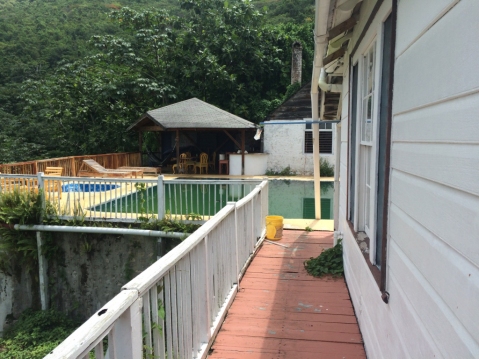
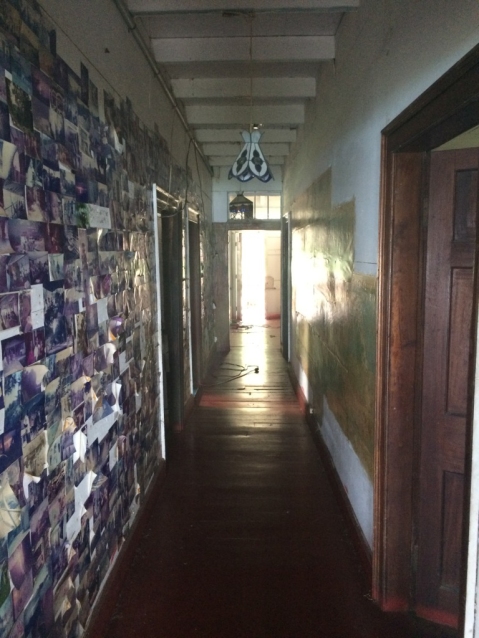
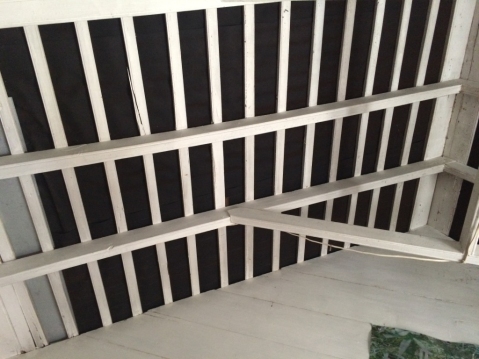
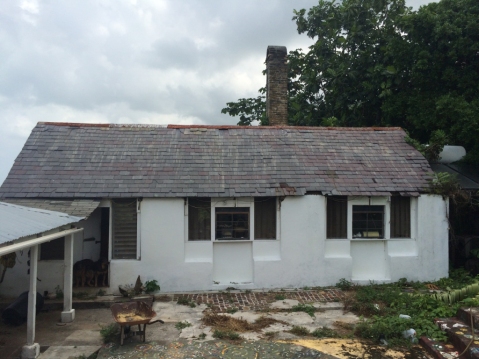
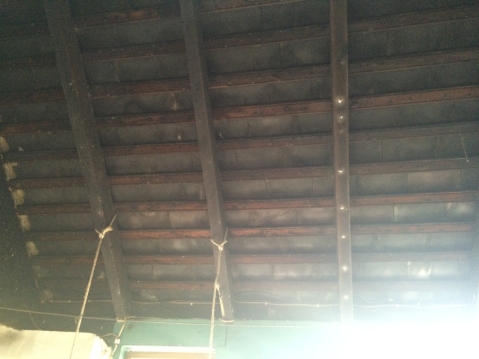
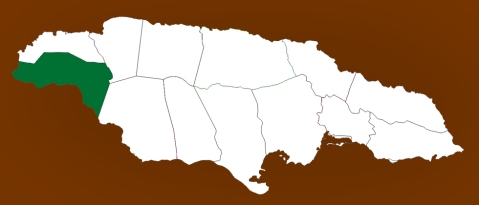

Please send me the source/citation for this memoir by George Pinnock. I know the area and am working on a history of it.
LikeLike
Bill,
I just sent to your email all I have on the Shafston Great House.
Michael
LikeLike